| To
Mr. F- |
| That
upon the un-christian and most diabolical usage of my
brother Negroes- the illegality- the horrid wickedness
of the traffic- the cruel carnage and depopulation of
the human species- is painted in such strong colours-
that I should think would (if duly attended to) flash
conviction- and produce remorse in every enlightened and
candid reader. |
| In
some one of your letters which I do not recollect- you
speak (with honest indignation) of the treachery and chicanery
of the Natives. My good friend, you should remember from
whom they learnt those vices: The first Christian visitors...learnt
such acts of deception- and even wanton cruelty- [and]
learnt to turn the knavish and diabolical arts...upon
their teachers. |
|
Your
most humble servant,
|
|
|
|
|
|
| Ignatius Sancho
was born on a slave ship, but never lived in the West Indies. His
letters were not published until after his death, but he was so well
known in England that there was a pre-publication subscription list
of over 1,000 people (90). Sancho
appeals to a literary class that is capable of understanding the plight
of other human beings. He also attacks normal religious
justifications of slavery. His eloquence and refined style also contradicted
the common notion that the blacks were not intelligent. Sancho has
the distinction of being the most popular and respected black writer
in 18th century England. Ottobah Cugoano was another slave who found
freedom and education. He wrote Thoughts and Sentiments on the
Evil and Wicked Traffic of Slavery, in which he criticizes theological
and economical justifications of the
institution. |
|
| It
is therefore manifest, that something else ought yet to
be done; and what is required, is evidently the incumbent
duty of all men of enlightened understanding, and of every
man that has any claim or affinity to the name of Christian,
that the base treatment which the African Slaves undergo
ought to be abolished; and it is moreover evident, that
the whole, or any part of that iniquitous traffic of slavery,
can nowhere, or in any degree, be admitted, but among
those who must eventually resign their own claim to a
degree of sensibility and humanity. |
| Ottobah
Cugoano, Thoughts and Sentiments on the Evil and Wicked
Traffic of Slavery (91) |
|
|
|
| Like
Sancho, Cugoano writes to a learned audience, which implies
that both men felt that the educated held the power to create
social change. Although not as popular as Sancho, Cugoano was
also an extremely influential black writer in the 18th century. |
|
|


